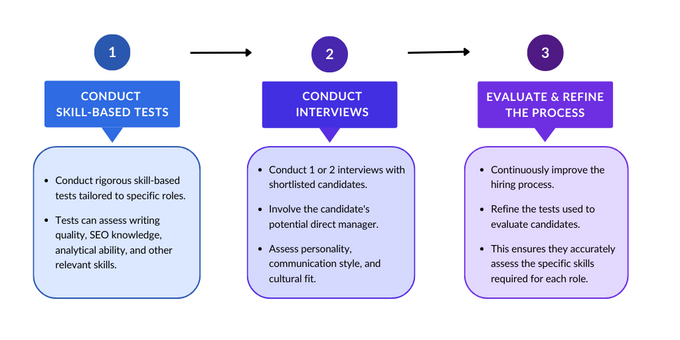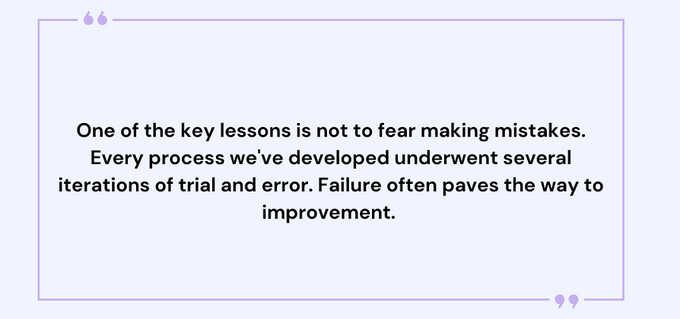How to hire and manage a remote content team
Published June 13, 2024

AI Summary
Key takeaways
- Prioritize a diverse range of skills and adaptability for new hires.
- Collaborative company culture is essential for remote teams.
- Effective management involves balancing autonomy with accountability.
The Covid-19 pandemic accelerated the adoption of remote work, with 74% of companies now planning to make it a permanent option for some of their workforce. As businesses embrace remote work models, understanding how to hire and manage remote content teams becomes crucial for success in this evolving work landscape.
Benefits of remote hiring
Traditional hiring practices often restrict companies to sourcing expert talent within a specific geographic location, limiting their options. However, remote hiring breaks down these barriers, enabling businesses to recruit the best candidates regardless of their physical location.
By widening the talent search, companies can find individuals with diverse skills, perspectives, and cultural backgrounds, enhancing creativity and innovation within the team.
One of the most significant benefits is the ability to access the best talent from anywhere in the world.
Additionally, remote work promotes work-life balance, reducing the need for lengthy commutes and enabling employees to create their ideal work environment. This fuels productivity and conversion rates, with 90% of remote workers reporting that they are equally or more productive when working remotely than in an office environment.
Hiring remote content team members
Key skills and qualities
When hiring remote content team members, it's crucial to look for a broad range of skills, depending on the role. For instance, content strategists may require strong analytical and language understanding skills, while writers might need exceptional creativity and communication abilities.
As effective communication is vital in a remote setting, candidates in any role should exhibit excellent written and verbal skills. A vital skill that might not be mentioned as much in all the social media content surrounding remote work.
Almost everyone has the potential to work remotely, but some may struggle with distractions or time management.
While skills are crucial, evaluating a candidate's adaptability to remote work is equally important. Look for individuals who demonstrate self-motivation, time management skills, and the ability to work independently. What matters most is meeting the company's short- and long-term goals. How team members achieve these are up to them.
» Find out whether you need writers or experts to craft superior content.
The recruitment process
When hiring candidates for a remote content team, it is important to follow a thorough and effective process:
Integrating new employees
Developing a comprehensive onboarding process is crucial to successfully integrating newly hired remote employees. Providing clear expectations, assigning mentors, and offering relevant training enable new team members to become productive from day one.
By involving them in real projects and client work, remote employees can quickly integrate into the team and contribute effectively.
Remote company culture
In a team where employees are geographically dispersed, fostering a strong sense of connection and belonging is essential. However, this can be challenging, especially with new hires and teams.
The challenge
As reported by more than one in five remote workers, the leading challenge they face is difficulty with communication and collaboration. One of the primary challenges when building a team is establishing a strong company culture in a remote environment.
Without physical proximity, team members may feel disconnected, leading to decreased engagement and productivity.
Potential solutions
To address this, companies should consider:
- Fostering regular communication, including one-on-one, team, and whole company meetings
- Conducting virtual team-building activities like holding competitions
- Allowing for two-way feedback between team members and management
- Encouraging and rewarding collaboration
- Giving employees recognition and praise when they earn it
It's also important to consider the cultural fit when hiring new team members. While skills are important, cultural fit becomes crucial in content team roles as they require significant communication and teamwork.
» Discover the benefits guest posting can have on your team's content
Managing remote content teams
According to remote employees, the most significant benefit of remote work is having flexibility in how they spend their time at work. However, this can become an obstacle to managing a fully remote team effectively.
Effective team management is a balancing act. Remote work offers the benefit of autonomy and flexibility, but it must be balanced with accountability and meeting deadlines.
Steps to help you strike this balance include:
- Define your goals Start with clear company goals and break them down into team-specific objectives, ensuring that each team member understands their role in achieving the overall vision.
- Clarify expectations Ensure each team delivers content on time and with high performance by establishing clear expectations by providing the necessary resources and support to meet deadlines.
- Create a roadmap Team leaders should break down goals into individual tasks and set deadlines, ensuring team members have a clear roadmap for their responsibilities.
- Hold daily check-ins These check-ins allow team members to review progress and plans, fostering open communication and strategizing.
- Assess the impact of delays Analyze setbacks and consider providing additional help if needed, collaborating with team members to find solutions and maintain productivity.
- Promote autonomy Empower team members to decide how they achieve goals while ensuring alignment with objectives, encouraging a sense of ownership and creativity within the team.
» Explore the role of editors and content managers in the age of AI.
Key lessons for building a high-performing remote content ream
Building and managing a high-performing content team requires a learning mindset and a willingness to adapt.
Embracing failure as an opportunity for growth and continually refining hiring and management processes is essential.
Other key lessons are:
- Hiring individuals who possess diverse skills contributes to a dynamic and innovative team.
- Treating others with kindness, politeness, and helpfulness can foster a positive work environment, leading to better performance.
- By creating a culture that values growth, collaboration, and continuous improvement, a remote content team can go from strength to strength.
Is a remote work model right for your content team?
Remote hiring offers many advantages, like access to a global talent pool, increased diversity, and reduced overhead costs. However, building a remote team requires proactive strategies to overcome challenges, such as establishing a strong company culture and effectively integrating new hires.
When managed effectively with clear goals and a positive work culture, remote workers can excel, delivering excellent results.
» Discover how content creation is changing performance marketing.








